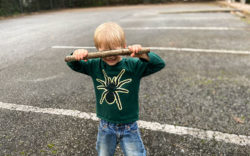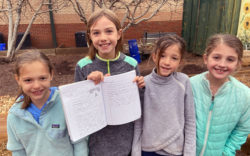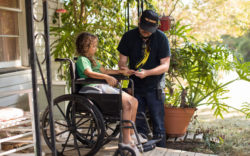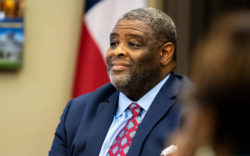High schoolers’ opinions on their complex worlds can vary just as much as the students themselves.
For some, the violence that took 17 lives in Parkland, FL is all too real. “It’s scary because you don’t know when your life might be in danger,” said Amber Lawson, 16, a student at Clarke Central High School. “I feel safer at home than at school, because at home I know where to hide.”
But not all students share these sentiments. Kevin Gresham, 16, who was hanging out with friends after school on a recent afternoon, said he doesn’t let the stories of school shootings affect him. “It feels normal,” he said. “You just stay to yourself.”
But no matter how much fear or comfort students find within the halls of their schools, Clarke County School District Superintendent Demond Means is making one thing clear: He would much rather build trust between students and staff and hire more school counselors than even consider arming teachers.
Means believes there are enough guns in the community, and far too many that children can already access. “Any suggestion that teachers should be armed is the most ridiculous thing I’ve ever heard,” he said during a recent forum on school safety at the Athens-Clarke County Library hosted by the Athens Anti-Discrimination Movement. “It shows a lack of sophistication in trying to figure out what we really need to do with [gun] policies.”
Instead, Means says he is looking at ways to holistically improve school climate, bring in counselors and social workers and decrease class sizes. Often, district personnel can identify a troubled student before he or she even reaches middle school—but with slim resources, there’s only so much they can do. “What’s sad is that we know who they are, but we don’t have the resources to wrap our arms around them and support them and their families from an early age,” he said.
Police Presence
Following the school shooting in Parkland—one of at least 14 in the U.S. so far this year, according to CNN—parents across the country turned to their own schools and asked the inevitable question, “Could this happen here?” Unfortunately, the answer is yes. But reacting to the violence versus preventing it are two very different schools of thought. In Clarke County, Means said he is working to create a culture of prevention, rather than one that reacts to the violence by scaling up other tactics—namely, a greater police presence.
Right now, an Athens-Clarke County police officer is assigned to each middle and high school in the district—six officers total. ACC Police Chief Scott Freeman said these officers, called school resource officers, are hired from within the officer pool when there is an opening at a local school and, because of this, have the same training as any other officer. Once they are named to the position, they receive additional training. “When a police officer has been on the job for a number of years, they can apply to be an SRO. We work internally to screen out who might make a good SRO, and we work with the school district to select them,” he said. “They also go through certification to be an SRO. That involves training in specific situations they might encounter.”
Means said the district has also contracted with Safe Havens International, a nonprofit organization, to assess the district and do a security audit.
But the question of next steps for this subset of the local police force is still up in the air. The district’s police chief, former GBI agent and ACCPD assistant chief Fred Stephens, retired in January and has not been replaced. Before leaving, Means said Stephens suggested expanding the school resource officer force. But Means is holding back for now, weighing other options before increasing the police presence in schools.
“I want to be sure we do it in a thoughtful way, if we expand our force, because while we’re discussing the issue of school shootings, I don’t want to perpetuate the school-to-prison pipeline, too,” he said. “It’s really tricky, and I want to do it in a thoughtful way… It’s looking at it from a restorative justice perspective and an equity lens. I don’t know if it’s about ‘how many,’ but how do we want to police our students if you’re a school district resource officer?”
And while ACC police train for active shooter drills in places across the county—including schools, hospitals, theaters and even downtown—they will never do active shooter training while students are in school, said Means.
“That’s not mentally and socially appropriate,” he said. “We do conduct what we call hard lockdowns and soft lockdowns. We have not been as vigilant in conducting those drills. I’ve asked our principals to be more vigilant going forward, and there will be drills in the spring just to be sure kids and staff understand what the process is.”
Many students and teachers have already experienced these drills. “Soft” lockdowns involve locking a classroom door but carrying on with lessons, while “hard” lockdowns involve locking the door, turning off the lights and remaining out of view from the door. Some students described an “intermediate” lockdown that was a combination of the two—lights off but continuing to work—although that’s not typical protocol.
Lawson said she thinks there should be more training for students like herself on steps they can take to defend themselves. While the drills help her visualize steps to protect herself, she still feels unsettled.
“What if he gets in a classroom?” she said, citing a news report about training for students that involves everyone grabbing an object and throwing it at an intruder if they get into a classroom. “What if he just comes in there? In high school, everyone is really on their own.”
Climate Change
Marcus Barrow, 17, tries to keep things in perspective. The Clarke Central student said he thinks about violence in school, but he also doesn’t want it to affect his work. “I’m just thinking about, are we safe and stuff like that,” he said. “I feel safe at times. I’ve just learned to always be alert.”
This general mindset is one that Means is trying to convey through resources that don’t involve police officers. Improving school climate lessens the chances of a student falling through the cracks and turning to violence, he said. He pointed to an incident last month where Coile Middle School administrators received word that a student had brought a gun to school. Within 30 minutes, Freeman and Means said, detectives were interviewing students and determining the source of the threat. While it turned out the gun report was a rumor, Means saids the incident underscores the importance of having staff whom kids can trust.
School climate also plays into this trust. While in the past prevention programs targeted individual instances of bullying, recent years have seen programs expand to include training among students, teachers and staff that help increase overall school climate. This includes engaging families, encouraging students to see their school as their community, and providing students with ways to feel empowered and that their voice matters.
Georgia’s annual School Climate Ratings help put on paper what students and teachers are feeling inside a school. In Clarke County, star ratings for Clarke Central and Cedar Shoals high schools have remained steady or improved over the past four years, going back to when data was first collected in 2014. At Clarke Central, for example, the school’s rating has increased from two stars in 2014 to three stars in 2017. Cedar Shoals has received four stars in three of the past four years.
But the bottom line is that you can’t always prevent children—especially teenagers—from making bad decisions. Part of the lessons you learn in school are life lessons, good and bad.
“I wish we could get to a place where we can guarantee there are no weapons entering a school, but that’s a hard statement to make,” Means said. “We will make our very best attempt to be sure any contraband doesn’t enter our schools, but unfortunately young people can make poor decisions, and they bring those things into our schools. This is why we want to create an environment where, if young people learn about something, they can tell an adult.
“I’d rather be preventative, which means addressing the social and emotional needs so these things don’t happen in the first place.”
Like what you just read? Support Flagpole by making a donation today. Every dollar you give helps fund our ongoing mission to provide Athens with quality, independent journalism.










